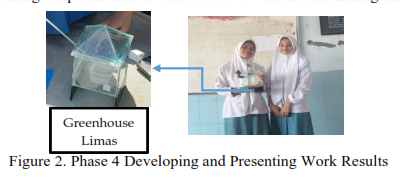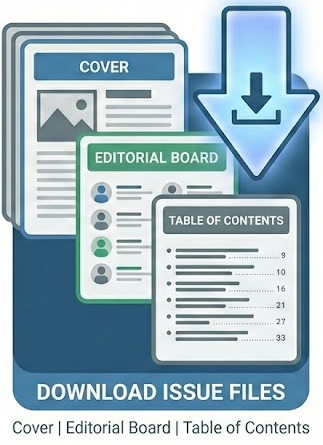Improving Problem-Solving Skills Using ESD Integrated PBL Models Assisted with the Greenhouse Limas Project
DOI:
https://doi.org/10.30736/seaj.v6i2.1097Keywords:
PBL, ESD, Problem-Solving SkillsAbstract
Improving Problem-Solving Skills Using ESD Integrated PBL Models Assisted with the Greenhouse Limas Project. Problem-solving skills in high school students are still low, there are still many students who have not been able to develop problem-solving so innovative learning models are needed in learning at school. This study aims to describe the implementation of the ESD-integrated PBL model utilizing greenhouse lime to improve students' problem-solving skills. The type of research used in the research is this research using the type of Quasi-Experimental Design research. The participants in this study are students of class X Mipa at one of the high schools in Pamekasan Regency. This study uses 2 classes, namely the control class and the experimental class. Based on the results of the research, it was concluded that the ESD-integrated PBL model learning activities to improve the solving skills of class X students were carried out with an average percentage of 95.55% in the very good category. The application of ESD-integrated PBL model learning can improve students' problem-solving skills. This is characterized by 1) the results obtained from the post-test score are higher than the results of the pre-test with an N-Gain of 0.78 in the high category, while in the control class, the results of the N-Gain obtained are 0.67 with the medium category 2) the results of the post-test of the two classes in the independent test are 0.162 which means that the significant value is greater than 0.05, then H1 is accepted. Thus, there was a significant difference in the mean post-test scores of the experimental class and the post-test of the control class. Students' responses to the application of ESD-integrated PBL model learning to improve students' problem-solving skills based on the analysis of the response questionnaire obtained a positive response in the experimental class with an average percentage above 70%, which means that the points on the student response questionnaire were in a good category.
Downloads
References
Agusti, K. A., Wijaya, A. F. C., & Tarigan, D. E. (2019). Problem-Based Learning With Esd Context To Improve Critical Thinking Skills And Sustainability Awareness Of High School Students On Global Warming Material. VIII, SNF2019-PE-175–182.
https://doi.org/10.21009/03.snf2019.01.pe.22.
Ajri, A., & Diyana, T. (2023). Development of E-Modules Based on Problem-Based Learning Assisted by Live Worksheets to Optimize Problem-Solving Skills. JKPI: Journal of Science Education Studies, 3(2), 223–234.
Afiati, Bintana. 2015. Implementation of PBL in the Core Sub-Material of Economic Problems/Scarcity. Yogyakarta State University.
Alatas, F., & Fauziah, L. (2020). Problem-based learning model to improve science literacy skills on the concept of global warming. JIPVA (Jurnal Pendidikan IPA Veteran), 4(2), 102.
https://doi.org/10.31331/jipva.v4i2.862.
Alfianita, M. Z., Wahyuni, E. S., (2023). Problem-Based Learning Based on Technology Utilization on Global Warming Material to Improve Creativity and Physics Learning Outcomes Jurnal Pembelajaran, 3(7), 549–555.
https://doi.org/10.17977/um065v3i72023p549-555.
Alvinda, D., Rahmalia, D., & Zahrotin, A. (2021). Analysis of Physics Problem Solving Ability on Parabolic Motion Material for Senior High School Students. Proceedings of Integrative Science Education SeminarVol.1,2021,1,575–580. https://prosiding.iainponorogo.ac.id/index.php/pisces.
Andriani, W., Sundari, P. D., Dwiridal, L., Dewi, W. S., & Fortuna, A. (2024). Physics E-Module Design as Problem-Based Learning in Improving Student Learning Outcomes. Education Expert, 22 (1), 38-52.
https://doi.org/10.24036/pakar.v22i1.444.
Arends, R.I. (2014). Learning To Teach (Tenth Edition). In McGraw-Hill Education: Vol Tenth Edit.
Ardianti, R., Sujarwanto, E., & Surahman, E. (2022). Problem-based Learning: What and How. Diffraction, 3 (1), 27–35.
https://doi.org/10.37058/diffraction.v3i1.4416.
Aripin, W. A., Sahidu, H., & Makhrus, M. (2021). Effectiveness of Physics Learning Devices Based on Problem-Based Learning Model to Improve Students' Problem Solving and Critical Thinking Skills. Indonesian Journal of Physics Research and Learning, 3(1). https://doi.org/10.29303/jppfi.v3i1.120
Ayudha, Churoni Fryda Hajar., Setyarsih, Woro. 2021. Literature Study: Analysis Practice Learning Physics in High School for Practice Skills Solution Problem. Journal of Physics Education Undiksha. Vol. 11 No. 1.
Azmi, Nurul., Asrizal., Mufit, Fatni. 2021. Meta-Analysis: The Influence of the Problem-Based Learning Model on Motivation High School Physics Science Process Learning and Skills. Journal of Study Results, Innovation, and Applications in Physics Education. Volume 7, Number 2.
Azura, Denisa., Nisa, Sahrun., Suriani, Ari., 2024. Literature Study: Implementation of Model-Based Learning (PBL) to Improve Elementary School Students' Mathematical Problem Solving Skills. Humantora Social Education Journal. Vol.3, No.2.
https://doi.org/10.30640/dewantara.v3i2.2651.
Damayanti, F. A., & Surjanti, J. (2022). Implementation of PBL Model with ESD Context in Improving Learning Outcomes and Sustainability Awareness of Farida Students. Buana Pendidikan, 18(1), 93–105.
Danial, M., & Sanusi, W. (2020). Preparation of Student Activity Sheets (LKPD) based on investigation for teachers of Parangtambung II State Elementary School, Makassar City. Proceedings of the National Seminar of the Institute for Research and Community Service, 615–619.
https://ojs.unm.ac.id/semnaslpm/article/download/11888/7003.
Darwati, I. M., & Purana, I. M. (2021). Problem-Based Learning (PBL): A Learning Model to Develop Students' Critical Thinking. Widya Accarya, 12(1), 61–69.
https://doi.org/10.46650/wa.12.1.1056.61-69.
Daryanti, S., Sakti, I., & Hamdani, D. (2019). The Effect of Problem-Solving Learning Model Oriented to Higher Order Thinking Skills on Physics Learning Outcomes and Problem Solving Ability. Jurnal Kumparan Fisika, 2(2), 65–72. https://doi.org/10.33369/jkf.2.2.65-72.
Dinda Kurnia Putri, Joko Sulianto, & Mira Azizah. (2019). Mathematical Reasoning Ability Reviewed from Problem-Solving Ability. International Journal of Elementary Education,3(3), 351–357.
https://ejournal.undiksha.ac.id/index.php/IJEE.
Daughter, Yullya Erlina Eka.., Lesmono, Albertus Djoko. 2021. The Influence of the Problem-Based Learning Model with STEM Approach to Learning Outcomes Cognitive in Learning Physics in High School. Journal Learning Physics (JPF). Vol 10 No 2.
Djoyowasito, G., Ahmad, A. M., Lutfi, M., & Anggra, A. (2018). Design and Construction of a Freshwater and Salt Water Production Model from Seawater Based on the Greenhouse Effect of the Pyramid Cover Type. Journal of Tropical Agricultural Engineering and Biosystems, 6(2), 107–119.
Ekamilasari, E., Permanasari, A., & Pursitasari, I. D. (2021). Critical thinking skills and sustainability awareness for the implementation of education for sustainable development. Journal of Science Education Research Journal, 5(1), 46–53.
www.journal.uny.ac.id/jser.
Fadliah. (2008). Global Warming, Causes, Impacts and Solutions. Rainbow Journal of Science, Vol 1, No 1, 1-15.
http://ejurnal.ung.ac.id/index.php/JPI/article/view/576.
Firmanyah,. et al. The Influence of the Problem-Based Learning (PBL) Model on Ability Solution Problem Physics High school student. Physics Science Education Journal (PSEJ), Volume 2 Number 2.
Indah, N., Sukariasih, L., Fisika, J. P., Universitas, F., Oleo, H., & Indonesia, K. (2022). Analysis of Students’ Physics Problem Solving Ability on II Newton’s Law Materials at SMK Negeri 02 Bombana. 7(2).
https://doi.org/10.36709/jipfi.v7i2.25144.
Indryani, I., Rusdi, R., Fitri, H., & Rahmat, T. (2023). Development of Student Worksheets (LKPD) Based on the Student Facilitator and Explaining (SFAE) Learning Model in Mathematics Learning for Class VIII of SMPN 2 Ampek Angkek in the 2021/2022 Academic Year. Journal on Education, 5(2), 3681–3698.
https://doi.org/10.31004/joe.v5i2.1050 Ipi355898.Pdf. (n.d.).
Jayadi, Agung., Putri, Dessy Hanisa., Johan, Henny. (2020). Identification Provision 21st Century Skills in Aspects Skills Solution Problem Bengkulu City High School Students in Physics Subjects. Journal Coil Physics. Vol.3 No.1.
https://ejournal.unib.ac.id/index.php/kumparan_physics .
Lestari, Eka Putri. (2019). Development Instrument Test Skills Solution Problems with Business and Energy Concepts in High School. Journal Coil Physics. Vol 2 No 3.
Mardhiyah, R., Aldriani, S., Chitta, F., & Zulfikar, M. (2021). Pentingnya Keterampilan Belajar di Abad 21 sebagai Tuntutan dalam Pengembangan Sumber Daya Manusia. Lectura : Jurnal Pendidikan, 71(1), 63–71.
Mukti, Fitri., Connie., Medriati, Rosane. (2018). Worksheet Development Student Learning (LKPD). Physics For Increase Ability Think Creative Sint Carolus High School students, Bengkulu City. Journal Coil Physics. Volume 1 Number 3 (2018).
Nasihah, Evi Durotun, et al. The Influence of Peer Tutors in Problem-Based Learning Against Skills Think Critical Physics High school student. Journal of Physics Education (JPFA). Vol 8, No 1.
Novianti, Ade., Bentri, Alwen., Zikr, Ahmad. (2020). Influence Application of the PBL Model to Activities and Learning Outcomes Students in Learning Thematic Integrated in Class V Elementary School. Journal Basicedu. Volume 4 Number 1 of 2020.
https://jbasic.org/index.php/basicedu .
Polya, G. 2014. How To Solve It. A New Aspect of Mathematical Methods. Princeton University Press.
Ramdhani, Zulmi., et al. (2019). Importance of Collaboration in Creating System The education Quality. Mediapsy. Vol. 5, No. 1, 40-48.
Riduwan. 2015. Measurement Scale Variables Study. Bandung: Alphabeta.
Sarah, T., & Witarsa, R. (2023). Pengaruh Pembelajaran Kolaborasi terhadap Keterampilan Menirukan Gerak Hewan pada Siswa Sekolah Dasar. Journal of Education Research, 4(1), 226–233.
https://doi.org/10.37985/jer.v4i1.152.
Sari, Wulan., et al. (2023). Description Device Learning Physics Problem-Based Learning Model in the Independent Curriculum. Journal of Education Tambusai. Volume 7 Number 2.
Rohmah, A. N., Septaria, K., & Santoso, A. (2024). THE IMPACT OF PHET-ASSISTED EXPERIMENTAL LEARNING METHODS ON STUDENTS'SCIENCE PROCESS SKILLS IN SCIENCE TOPICS. EDUPROXIMA (JURNAL ILMIAH PENDIDIKAN IPA), 6(3), 913-921.
Azzahroh, S. N. F., Septaria, K., & Wulandari, S. A. (2024). Pengaruh Model Pembelajaran Inkuiri Bermuatan Nature Of Science (NOS) Terhadap Argumentasi Ilmiah Pada Topik Zat Aditif. Jurnal Penelitian Sains dan Pendidikan (JPSP), 4(1), 13-21.
Septaria, K., & Rismayanti, R. (2022). The effect of scientific approach on Junior High school students’ Scientific Creativity and Cognitive Learning Outcomes. Jurnal Penelitian dan Pengkajian Ilmu Pendidikan: e-Saintika, 6(3), 173-189.
Septaria, K. (2022). Kemampuan Bertanya Versus Hasil Belajar Kognitif Mahasiswa: Analisis Korelasi Kemampuan Bertanya Pada Level Mahasiswa IPA. EDUPROXIMA (Jurnal Ilmiah Pendidikan IPA) Universitas Bhinneka PGRI Tulung Agung, 4(2), 60-71.
Septaria, K., & Fatharani, A. (2022). Manga versus webtoon: Alternative science learning module based on Dr Stone. Jurnal Inovasi Pendidikan IPA, 8(1), 11-22.
Septaria, K., & Dewanti, B. A. (2022). Analisis kepuasan mahasiswa Pendidikan IPA menggunakan learning management system Brightspace pada matakuliah Mitigasi Bencana. JIPVA (Jurnal Pendidikan IPA Veteran), 6(1), 19-33.
Siregar, Merinda Noorma Novida., Aghni, Rizqi Ilyasa. (2021). Development Learning Based on Problem-Based Learning (PBL) to Increase higher-order thinking Skills (HOTS). Journal of Accounting Education (JPAK). Vol.9 No.2 (2021).
Widyasari, Sevina Rahma, et al. (2023). Analysis Implementation and Activities Study Student Using the Case Based Learning Model on Pollution Material Environment. Journal Scientific Education Profession. Volume 8, Number 4, November 2023.
Windari, Chess Okti., Yanti, Fitri April. 2021. Application of the Problem-Based Learning Model for Increase Skills Thinks Critical Learners. Journal of Science and Mathematics Education. Vol 9, No 1.
Zulfah, Neng Leli Nailul., Purnamasari, Shinta., Abdurrahman, Dudung. 2024. Implementation of Integrated Problem-Based Learning (PBL). Education for Sustainable Development (ESD) towards Literacy Environment Students On Topic Energy. Journal of Science Education Studies. Vol 4, No 1.

Downloads
Published
How to Cite
Issue
Section
License
Copyright (c) 2024 Innita Fashihatul Qiroah, Nurita Apridiana Lestari

This work is licensed under a Creative Commons Attribution-ShareAlike 4.0 International License.
Authors who publish with this journal agree to the following terms:
- Authors retain copyright and grant the journal right of first publication with the work simultaneously licensed under a Creative Commons Attribution-ShareAlike 4.0 International License that allows others to share the work with an acknowledgment of the work's authorship and initial publication in this journal.
- Authors are able to enter into separate, additional contractual arrangements for the non-exclusive distribution of the journal's published version of the work (e.g., post it to an institutional repository or publish it in a book), with an acknowledgment of its initial publication in this journal.
- Authors are permitted and encouraged to post their work online (e.g., in institutional repositories or on their website) prior to and during the submission process, as it can lead to productive exchanges, as well as earlier and greater citation of published work (See The Effect of Open Access).

This work is licensed under a Creative Commons Attribution-ShareAlike 4.0 International License.








